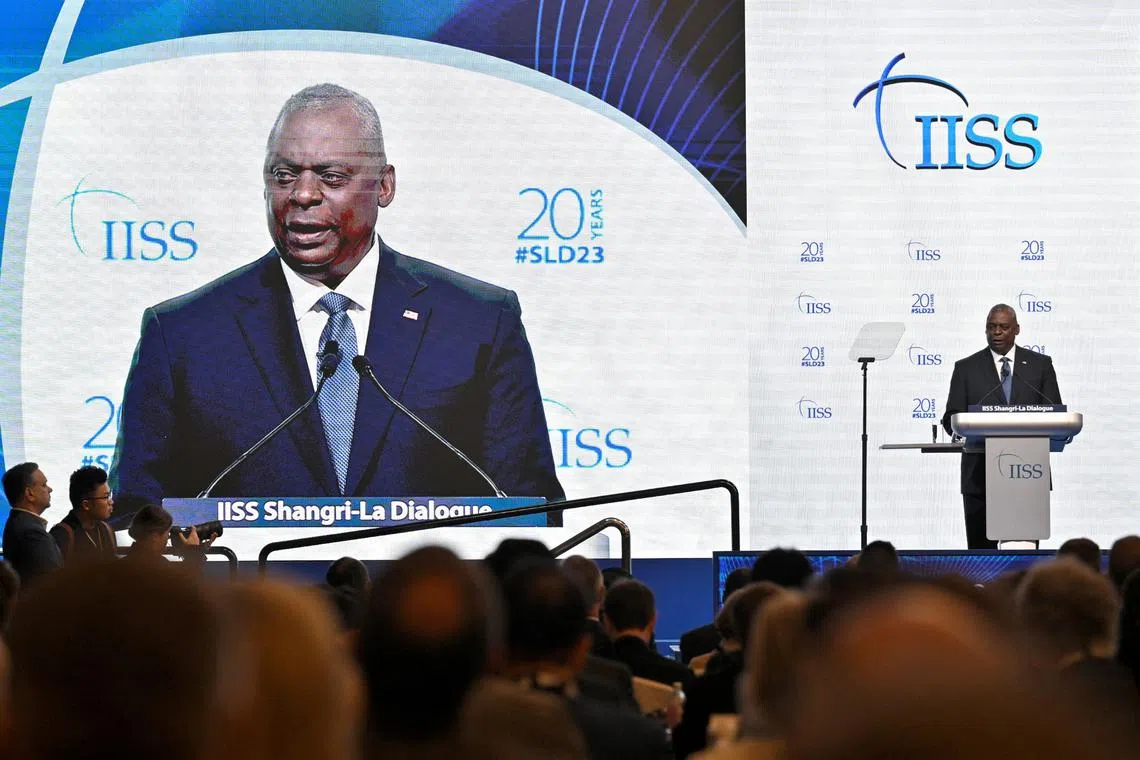Shangri-La Dialogue
‘The right time to talk is any time’: US urges China to step up defence dialogue
Sign up now: Get insights on Asia's fast-moving developments

US Secretary of Defence Lloyd Austin said the US does not “seek conflict or confrontation”, but will not “flinch in the face of bullying or coercion”.
PHOTO: REUTERS
SINGAPORE - The United States on Saturday issued a fresh call for talks with China, as US Secretary of Defence Lloyd Austin urged Beijing at Asia’s top security summit to engage with Washington as “responsible defence leaders”.
“For responsible defence leaders, the right time to talk is any time,” Mr Austin said in a speech laying out the US vision for leadership in the Indo-Pacific on the second day of the Shangri-La Dialogue in Singapore.
“The right time to talk is every time. And the right time to talk is now. Dialogue is not a reward. It is a necessity.”
Mr Austin’s speech took a three-pronged approach: simultaneously urging China back to the table for defence talks; laying out Washington’s military engagements in the region as deterrence against open conflict; and reassuring Indo-Pacific countries of US support and commitment.
Expressing concern at Beijing’s unwillingness for deeper defence engagement, Mr Austin said he hopes the situation will change soon.
“Great powers must be beacons of transparency and responsibility,” he added. “The United States is deeply committed to doing our part. And we are determined to keep this region open, peaceful and prosperous.”
The US has sought to deepen ties with countries in the region stretching from India to Australia, which China has characterised as a policy of encirclement in its backyard.
In a bid to tamp down tensions, US President Joe Biden has called for “guardrails” – including intensifying communication – to keep the two major powers from conflict.
But Beijing rebuffed a US request for a defence meeting
However, the two defence ministers shook hands at a dinner at the summit, though the pair “did not have a substantive exchange”, according to the Pentagon.
Chinese officials at the forum said talks with the US would not be possible as long as Washington insists on sanctioning General Li
Any meeting would have to be conducted on an equal footing, and it is up to the US to create the right conditions for it to take place, they said.
Singapore’s Defence Minister Ng Eng Hen noted that both powers appeared to desire open lines of communication.
“Nobody has said that ‘I don’t want to talk’,” Dr Ng said at a doorstop interview after Mr Austin’s speech. “They might have said that the preconditions have not been satisfied, but that is very different.”
Mr Austin also made specific mention of China’s increasingly aggressive behaviour in the Indo-Pacific, including “an alarming number of risky intercepts of US and allied aircraft flying lawfully in international airspace”.
Vowing to support America’s allies and partners against “coercion and bullying”, he said it was the US’ responsibility to mount a strong deterrence to conflict in the Taiwan Strait.
“We do not seek conflict or confrontation. But we will not flinch in the face of bullying or coercion… This is especially important in the Taiwan Strait,” he said.
“The United States remains deeply committed to preserving the status quo there… We will continue to categorically oppose unilateral changes to the status quo from either side.
“Conflict is neither imminent nor inevitable. Deterrence is strong today – and it is our job to keep it that way.”
Mr Austin added that the US was actively reinforcing its security alliances and partnerships “from the East China Sea to the South China Sea to the Indian Ocean”, running through a list of cooperation with regional nations, including the Philippines, Japan and South Korea.
He spoke as the US Navy conducted a routine transit through the Taiwan Strait, a move that China regularly finds provocative, Bloomberg News reported on Saturday.
Worries about a hot conflict over Taiwan have escalated in recent years.
In August 2022, then US House Speaker Nancy Pelosi visited the island,
China believes there are groups in Washington and Taipei pushing Taiwan towards a declaration of independence, while the US has countered that it is merely arming the island to deter China from invading it.
The intensifying Sino-US rivalry has permeated politics, trade and other areas of global governance,
Mr Austin disagreed with a perception among senior Chinese officials that Washington was goading Beijing into using force against Taiwan.
“It is in fact the opposite,” he said in response to the remark made by Dr Bonnie Glaser, a China expert at the German Marshall Fund of the United States. “We are doing everything in our power to maintain a free and open Indo-Pacific… With regard to Taiwan, it is the same… and so any kind of disagreement has to be resolved through diplomacy.”
While the US would do whatever it could to maintain the status quo in Taiwan, he said, “having a combat-credible military” would deter any “misguided decision” on the island.
On Mr Austin’s message of deterrence against conflict, retired top Singaporean diplomat Bilahari Kausikan, a delegate at the forum, noted “broad-based interest and hence growing cooperation in the Indo-Pacific, even from countries outside the region”.
He pointed to the attendance of six European defence ministers at the 2023 summit as an example.
“This is the largest number in a long time, or perhaps ever, which is notable given that there is a war going on in Ukraine,” he said.
Mr Bilahari, who chairs the Middle East Institute at the National University of Singapore, also warned against overplaying the significance of the lack of a US-China defence meeting at the 2023 summit.
“It would obviously be better if they (Mr Austin and General Li) had met,” he said. “But there have been recent meetings by US National Security Adviser Jake Sullivan, US Commerce Secretary Gina Raimondo, and CIA director William Burns with their Chinese counterparts, so it is not as if all communication is cut off.”
Another delegate, National University of Singapore associate professor of political science Chong Ja Ian said Mr Austin’s speech sought to relay Washington’s “consistency and reliability”, but that this remained to be seen.
Many Asian nations grew disenchanted with the US during the Trump administration, when Washington significantly dialled down engagement in the region, pulling out of the Trans-Pacific Partnership (TPP)
“The question at the back of many minds would be the US’ commitment and staying power, given variations in policy in the region over the past three presidential administrations and the current partisan divisions in the US,” he said.



